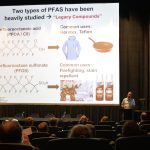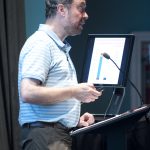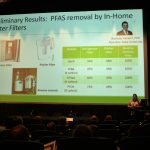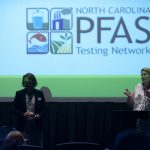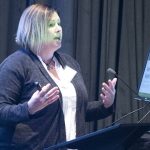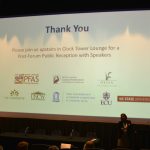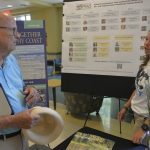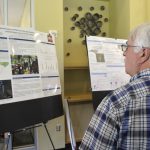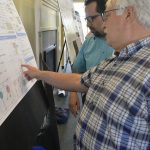The North Carolina Coastal Federation, PFAST Network and UNC–Wilmington hosted Emerging Contaminants in the Cape Fear Region: University Collaborations on Environmental, Drinking Water Supply and Human Health Effects on Friday, May 31 in Wilmington.
Composed of research presentations and a live Q&A, the forum served to provide a public conversation about the North Carolina PFAS Testing (PFAST) Network, define PFAS (per- and polyfluoroalkyl substances) and why they matter to North Carolina residents and visitors. The forum also demonstrated the collaborative research expertise and broad support for this initiative among seven universities across the state.
The afternoon kicked off with an introduction and overview of the North Carolina Policy Collaboratory and PFAST Network Research Initiative, followed by presentations from each of five research teams. Following each presentation, forum participants were encouraged to submit questions.

PFAS Forum, at UNCW May 31, 2019. Photo by Alan Cradick, May 31, 2019.
Not every inquiry was able to be addressed at the forum due to the high volume of questions, so the additional responses from the researchers are being assembled by PFAST Network investigators, which will be shared on the federation’s Emerging Contaminants webpage once completed.
See a recording of the forum, as well as presentations here.
The PFAST Network is a multi-university research program focused on understanding our exposure to industrial contamination of the environment and drinking water in North Carolina. The network is a statewide research collaboration to test for current levels of PFAS chemicals in drinking water and air samples across the state and is comprised of principal investigators from East Carolina University, North Carolina State University, UNC-Chapel Hill, UNC-Wilmington, UNC-Charlotte, North Carolina A&T and Duke University.
Created in response to a legislative mandate by the North Carolina General Assembly, this network has received $5 million in state funding to study the environmental and health effects of PFAS and the extent to which these compounds have infiltrated the state’s waterways. Although many of the network researchers have been studying the effects of PFAS for some time, this research project involves a collaborative approach to better understand the nature, scope, health and environmental impacts of this contaminants within North Carolina. State officials have said this research model is the first of its kind in the United States.
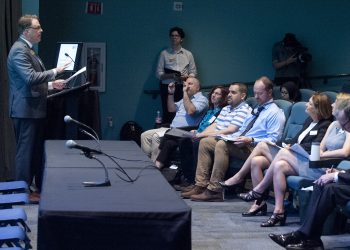
PFAS Forum, at UNCW May 31, 2019. Photo by Alan Cradick, May 31, 2019.
The concern about PFAS skyrocketed after a June 2017 article in the Wilmington StarNews reported that one of these industrial compounds, GenX, was found in the Cape Fear River in relatively high concentrations.
“The forum provided citizens the opportunity to learn more about the PFAST Network’s current research into the environmental and health effects of emerging contaminants on our state’s drinking water,” said federation board member David Cignotti.
“Kudos to the North Carolina Policy Collaboratory and the PFAST Network of scientists for their transparency.”
A reception followed the forum in the Clock Tower Lounge, where attendees had the opportunity to continue the discussion with presenters and investigators.
“Many of our local residents have been grappling with this issue for nearly two years now,” said Kerri Allen, coastal advocate for the Southeast region of the federation. “To be able to connect them with the researchers involved in these important research efforts was very rewarding.”
This forum was organized by the North Carolina Coastal Federation and the PFAST Network with generous support from the Orton Foundation.
See photos from the event by Alan Cradick:
- PFAS Forum, at UNCW May 31, 2019. Photo by Alan Cradick, May 31, 2019.
- PFAS Forum, at UNCW May 31, 2019. Photo by Alan Cradick, May 31, 2019.
- PFAS Forum, at UNCW May 31, 2019. Photo by Alan Cradick, May 31, 2019.
- PFAS Forum, at UNCW May 31, 2019. Photo by Alan Cradick, May 31, 2019.
- PFAS Forum, at UNCW May 31, 2019. Photo by Alan Cradick, May 31, 2019.
- PFAS Forum, at UNCW May 31, 2019. Photo by Alan Cradick, May 31, 2019.
- PFAS Forum, at UNCW May 31, 2019. Photo by Alan Cradick, May 31, 2019.
- PFAS Forum, at UNCW May 31, 2019. Photo by Alan Cradick, May 31, 2019.
- PFAS Forum, at UNCW May 31, 2019. Photo by Alan Cradick, May 31, 2019.
- PFAS Forum, at UNCW May 31, 2019. Photo by Alan Cradick, May 31, 2019.
- PFAS Forum, at UNCW May 31, 2019. Photo by Alan Cradick, May 31, 2019.
- PFAS Forum, at UNCW May 31, 2019. Photo by Alan Cradick, May 31, 2019.
- PFAS Forum, at UNCW May 31, 2019. Photo by Alan Cradick, May 31, 2019.
- PFAS Forum, at UNCW May 31, 2019. Photo by Alan Cradick, May 31, 2019.
- PFAS Forum, at UNCW May 31, 2019. Photo by Alan Cradick, May 31, 2019.
- PFAS Forum, at UNCW May 31, 2019. Photo by Alan Cradick, May 31, 2019.
- PFAS Forum, at UNCW May 31, 2019. Photo by Alan Cradick, May 31, 2019.
- PFAS Forum, at UNCW May 31, 2019. Photo by Alan Cradick, May 31, 2019.
- PFAS Forum, at UNCW May 31, 2019. Photo by Alan Cradick, May 31, 2019.
- PFAS Forum, at UNCW May 31, 2019. Photo by Alan Cradick, May 31, 2019.
- PFAS Forum, at UNCW May 31, 2019. Photo by Alan Cradick, May 31, 2019.
- PFAS Forum, at UNCW May 31, 2019. Photo by Alan Cradick, May 31, 2019.
- PFAS Forum, at UNCW May 31, 2019. Photo by Alan Cradick, May 31, 2019.
- PFAS Forum, at UNCW May 31, 2019. Photo by Alan Cradick, May 31, 2019.
- PFAS Forum, at UNCW May 31, 2019. Photo by Alan Cradick, May 31, 2019.
- PFAS Forum, at UNCW May 31, 2019. Photo by Alan Cradick, May 31, 2019.
- PFAS Forum, at UNCW May 31, 2019. Photo by Alan Cradick, May 31, 2019.
- PFAS Forum, at UNCW May 31, 2019. Photo by Alan Cradick, May 31, 2019.
- PFAS Forum, at UNCW May 31, 2019. Photo by Alan Cradick, May 31, 2019.
- PFAS Forum, at UNCW May 31, 2019. Photo by Alan Cradick, May 31, 2019.
- PFAS Forum, at UNCW May 31, 2019. Photo by Alan Cradick, May 31, 2019.
- PFAS Forum, at UNCW May 31, 2019. Photo by Alan Cradick, May 31, 2019.
- PFAS Forum, at UNCW May 31, 2019. Photo by Alan Cradick, May 31, 2019.
- PFAS Forum, at UNCW May 31, 2019. Photo by Alan Cradick, May 31, 2019.
- PFAS Forum, at UNCW May 31, 2019. Photo by Alan Cradick, May 31, 2019.
- PFAS Forum, at UNCW May 31, 2019. Photo by Alan Cradick, May 31, 2019.
- PFAS Forum, at UNCW May 31, 2019. Photo by Alan Cradick, May 31, 2019.
- PFAS Forum, at UNCW May 31, 2019. Photo by Alan Cradick, May 31, 2019.
- PFAS Forum, at UNCW May 31, 2019. Photo by Alan Cradick, May 31, 2019.
- PFAS Forum, at UNCW May 31, 2019. Photo by Alan Cradick, May 31, 2019.
- PFAS Forum, at UNCW May 31, 2019. Photo by Alan Cradick, May 31, 2019.
- PFAS Forum, at UNCW May 31, 2019. Photo by Alan Cradick, May 31, 2019.
- PFAS Forum, at UNCW May 31, 2019. Photo by Alan Cradick, May 31, 2019.
- PFAS Forum, at UNCW May 31, 2019. Photo by Alan Cradick, May 31, 2019.
- PFAS Forum, at UNCW May 31, 2019. Photo by Alan Cradick, May 31, 2019.
- PFAS Forum, at UNCW May 31, 2019. Photo by Alan Cradick, May 31, 2019.
- PFAS Forum, at UNCW May 31, 2019. Photo by Alan Cradick, May 31, 2019.
- PFAS Forum, at UNCW May 31, 2019. Photo by Alan Cradick, May 31, 2019.











